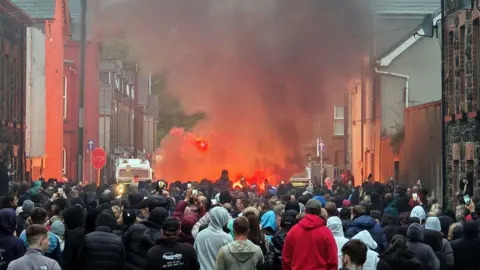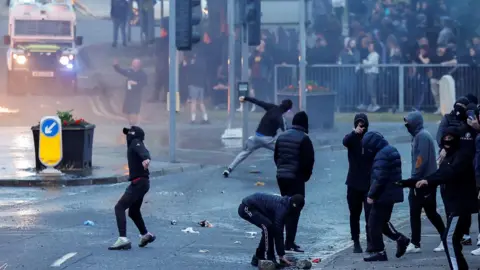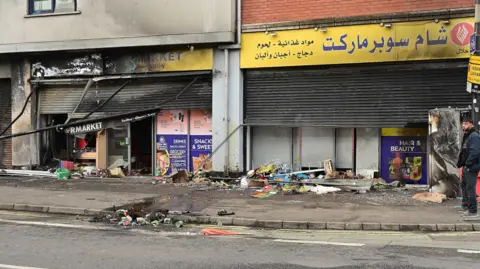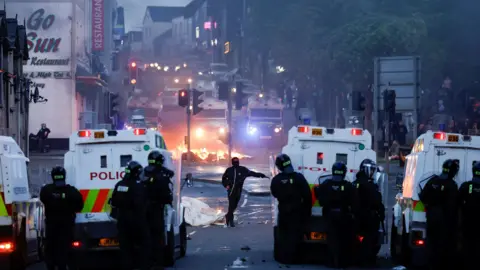How a peaceful protest descended into hate-filled violence
 Pacemaker
PacemakerA dangerous cocktail of factors came together to plunge Ballymena, County Antrim, into hate-filled violence.
Within 36 hours of a peaceful protest on Monday evening, 32 police officers had been injured as the authorities struggled to keep the peace.
The families who were targeted, many of them relatively new to Northern Ireland, have been left feeling terrified and terrorised.
The Police Service of Northern Ireland (PSNI) has branded the violence "racist thuggery", and pointed to a "mob mentality" fuelled by social media.
People do not become racists overnight.
It seems those involved had been waiting for an opportunity to vent their hatred.
The rioting broke out after a planned peaceful protest on Monday evening, in response to an alleged serious sexual assault in the County Antrim town on Saturday evening.
Racist graffiti appeared in the town on Sunday night.
On Monday morning, two teenage boys appeared in court and confirmed their names and ages through a Romanian interpreter. The two 14-year-olds denied the charges against them.
By Monday afternoon, a social media post advertising a planned protest at 7.30pm that evening had been widely circulated.
 Reuters
ReutersSeveral thousand people turned up at a place known locally as Ken's car park.
The Facebook post stated it was to be a "peaceful protest to show our anger at what cannot and will not be tolerated in this town".
There was a short march along Larne Street and Queen Street. A smaller crowd later gathered elsewhere, near the location of the alleged assault.
Youths with their faces masked and wearing gloves started attacking the police and a number of houses.
Looking at the pictures of young men trying to destroy people and property, their lust for violence was clear to see.
A large crowd was behind them, filming on mobile phones rather than intervening.
 Pacemaker
PacemakerStreet violence in Northern Ireland, in the months of June and July, is sadly nothing new.
Over the decades, it has largely been centred on parade disputes or bonfires, but last summer there was racially-motivated violence in Belfast.
The murder of three children in Southport led to riots in parts of England.
This triggered an anti-immigration protest in Belfast city centre, which descended into a day and night of violence, with further disorder in the next few days.
Loyalist paramilitaries were involved but to what extent was never firmly established.
The UVF (Ulster Volunteer Force) and UDA (Ulster Defence Association) have long-standing links to extreme far-right groups, and both have a presence in the Ballymena area.
The PSNI said there was no evidence of paramilitary involvement in the recent violence in the town, at this stage.
 Reuters
ReutersThe MP for North Antrim, Jim Allister, has said the violence is wrong and must stop immediately as "it distracts from the very real grievances".
The Traditional Unionist Voice leader said there had been "rapid demographic change" in Ballymena in recent years and claimed a "failure of successive authorities to manage integration or address local concerns has left many residents feeling ignored and disrespected".
According to recent research published by the Stormont Assembly, statistics show that Northern Ireland is the "least diverse part of the UK".
A report on international migration said that only 3.4% of Northern Ireland's population (65,600 people) are from a minority ethnic group.
That compares to 18.3% in England and Wales, and 12.9% in Scotland.
In a joint statement, all the parties that make up the Northern Ireland Executive have appealed for calm.
"Those weaponizing the situation in order to sow racial tensions do not care about seeing justice and have nothing to offer their communities but division and disorder."
The Social Democrat and Labour Party (SDLP) leader Claire Hanna described the outbreak of violence on Monday night as a "race-based pogrom".
She said people should "live and let live" and look after each other.
One of the many frightening videos on social media showed houses being attacked with families still inside.
A woman could be heard saying: "If they're local, they need out. If they're not local let them stay there."
The harrowing scenes have been condemned by politicians on all sides, including Prime Minister Sir Keir Starmer.
Social media continues to be a platform which is used and abused for coverage of the violence.
As well as extreme views and conspiracy theories, there have been many calls for calm, and not just from politicians and community leaders.
One of the people who posted the original call for a protest on Monday has appealed for the attacks to stop, describing them as "utter madness".
The calls for calm are becoming louder.
However, at the moment, not everyone is listening.
